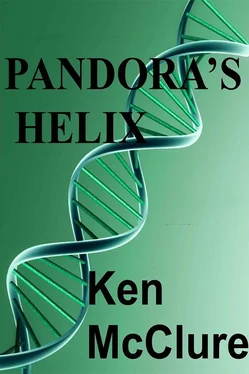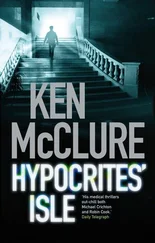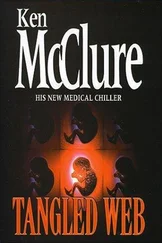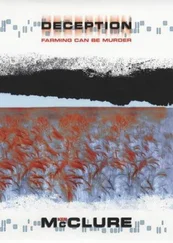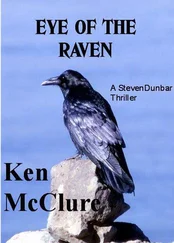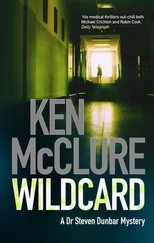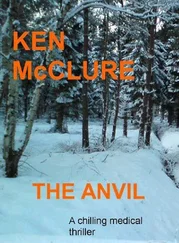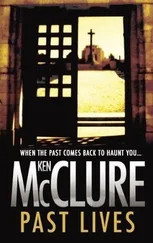Ken McClure - Pandora's Helix
Здесь есть возможность читать онлайн «Ken McClure - Pandora's Helix» весь текст электронной книги совершенно бесплатно (целиком полную версию без сокращений). В некоторых случаях можно слушать аудио, скачать через торрент в формате fb2 и присутствует краткое содержание. Год выпуска: 1997, ISBN: 1997, Издательство: Simon & Schuster, Жанр: thriller_medical, на английском языке. Описание произведения, (предисловие) а так же отзывы посетителей доступны на портале библиотеки ЛибКат.
- Название:Pandora's Helix
- Автор:
- Издательство:Simon & Schuster
- Жанр:
- Год:1997
- ISBN:978-0-684-48163-7
- Рейтинг книги:4 / 5. Голосов: 1
-
Избранное:Добавить в избранное
- Отзывы:
-
Ваша оценка:
- 80
- 1
- 2
- 3
- 4
- 5
Pandora's Helix: краткое содержание, описание и аннотация
Предлагаем к чтению аннотацию, описание, краткое содержание или предисловие (зависит от того, что написал сам автор книги «Pandora's Helix»). Если вы не нашли необходимую информацию о книге — напишите в комментариях, мы постараемся отыскать её.
Pandora's Helix — читать онлайн бесплатно полную книгу (весь текст) целиком
Ниже представлен текст книги, разбитый по страницам. Система сохранения места последней прочитанной страницы, позволяет с удобством читать онлайн бесплатно книгу «Pandora's Helix», без необходимости каждый раз заново искать на чём Вы остановились. Поставьте закладку, и сможете в любой момент перейти на страницу, на которой закончили чтение.
Интервал:
Закладка:
The tall, gangly accountant got to his feet and donned a pair of horn rimmed glasses before nodding to Tim Heaton and saying, “Of course.” He shuffled some papers before beginning, “Basically, ladies and gentlemen, we’ve got problems.”
There were groans around the table.
“We’re holding our own for the moment but the future doesn’t look good.”
“But what about the extra business we took from the old General when it closed?” asked Carol Martin, director of nursing services.
“Our financial position has been artificially sweetened by the closure of our nearest rival but patient projections seem to suggest that we may lose much of the extra business when the new surgical centre at University College Hospital comes on line in November. As usual, their marketing has been excellent and it looks like being a big success. GPs will be falling over themselves to get what they see as the newest for their patients.”
“Doesn’t mean the surgery will be any better,” said Mark Louradis, consultant surgeon, his Mediterranean features betraying irritation.
“Of course not,” said Heaton, “but image is important. We have to face it; University College has been extremely successful in promoting itself as a hospital at the very cutting edge of medical science.”
“True,” conceded Neef. “There’s scarcely a week goes by without some newspaper doing a feature on them. Last week, their Lithotripsy programme, this week, their new surgical facilities. Pharmaceutical companies must be queuing up to pour money into the place in the hope of reflected glory.”
“They don’t even do transplants,” said Louradis.
“The trouble is that the public are no longer intrigued by transplant surgery, Mark. The newspapers have exhausted all the angles and the chattering classes have become bored with it. We need new treatments to bolster our image and capture their imagination.”
Frank MacSween gave a slight snort.
Louradis said with a tight-lipped smile. “It’s getting to the stage when we’ll be spending more on advertising and marketing than we do on nurses,” he complained.
“A slight exaggeration, I feel,” said Tim Heaton, “But I say again, image is important. We are a big hospital and we’re good but we can’t afford to rest on our laurels. We have to move with the times, think of new ways of projecting ourselves, new ways of generating income.”
As usual, this kind of talk left Michael Neef feeling bemused. He had been a reluctant convert to NHS Trust philosophy. In the beginning he had wanted to shout, we’re a hospital not a bloody supermarket but time had mellowed him and he had come to accept that things had changed in medicine and this was the way they were going to be in future. Ironically he had given up a lucrative appointment in the United States and come home to England because he wanted to return to ‘real medicine’ instead of finance-oriented treatment. A revolution had occurred during his three year absence; a service had become a business.
It had been like that from the beginning in the States of course, where he had been Chief of Paediatric Oncology at Gregor Memorial Hospital in New York. His initial sense of freedom at having apparently unlimited resources and the best of equipment to practice medicine as he saw fit had been gradually eroded by the knowledge that it was not available to all those who needed it. His patients were those whose families could afford to pay for it. His initial belief that personal health insurance, which most people had, was just an alternative to the national system at home had to be modified in the light of what happened when such personal cover ran out, as it almost invariably did where terminal illness was concerned. Family grief was too often compounded by financial ruin as parents struggled to do their best for dying children.
Danziger continued with his report, outlining which requests for ex-budget equipment had been approved and which had been declined for the moment — put on hold, as Heaton liked to say. Each unit in the hospital was allocated an annual budget but it was accepted that medical advances or simple circumstances might dictate that requests for special funding outside this budget might have to be made. Neef had not lodged any request for equipment in the past few months but he had made out a case for special funding for a new chemotherapeutic drug. There were several new ones coming on to the market and he was keen to try this one after reading the clinical trial results in the journals.
Danziger looked at Neef and said, “Michael, I’m afraid we’ve had to decline your request that the new American drug, Antivulon, be made available to your patients en masse. The sub-committee took the view that benefits would be marginal and at this moment in time, the considerable extra costs could not be justified.”
Neef turned his pen end over end on the table for a moment while he considered his response. This was shaping up to be one awful day.
“I see,” he said. “Perhaps I can remind the sub-committee that I have been particularly restrained in my requests for new chemotherapeutic agents. I do not routinely request every new preparation that becomes available because I do my homework on them first. If I think the benefits will be marginal I do not ask for them. However,” Neef paused for effect. “If I do ask for a drug to be made available it is because I do believe that the benefits to my patients would be tangible. Antivulon has shown itself to be thirty percent less toxic to normal tissue cells when used against tumours and is much less distressing in terms of side effects. This is a very important factor where children are concerned.”
“We understand your disappointment, Michael, believe me,” said Heaton. “But with so many competing causes...”
“I will re-lodge my request this month,” said Neef.
“As you wish,” said Heaton anxious to defuse the situation. He looked across the table and said, “Perhaps our commercial contracts manager will have something to cheer us up. Andrew?”
Andrew D’Arcy, a small, puckish man wearing a blue pin striped suit and a pink bow tie smiled and said, “I have two pieces of good news.”
“Thank God for that,” said Frank MacSween in a stage whisper.
“The pharmaceutical company, Werner Mann, have requested that we carry out the clinical trial work on their new third generation, cephalosporin. They feel it will be particularly effective in clearing up urinary tract infections. The package offered by the company seems especially generous and could lead to further collaboration.”
“Excellent,” said Heaton. “I take it our consultant urologist knows all about this?”
“Peter is giving a seminar in Manchester today,” replied D’Arcy, “but the deal has his full approval.”
“Good. What about your second piece of news?”
D’Arcy looked at Michael Neef before saying apologetically, “Unfortunately I haven’t had time to discuss this with Michael beforehand. I understand he was tied up with the Press when I rang him but I’ve had a call from a biotechnology company called, Menogen Research.”
The name did not appear to mean anything to anyone at the table.
“This is a small local company, funded by venture capital some ten years ago. They’ve been developing gene therapy strategies for tumour treatment. They feel that they are now at the stage of moving to human clinical trials and would like to begin discussions along these lines.”
Heaton beamed and said, “Gene Therapy! Genetic Engineering! Now that would capture the public imagination. The Sunday papers are always full of it. This sounds exactly like the sort of thing we need to raise our profile. What do you think, Michael?”
“I think we need to know an awful lot more about Menogen Research before they get anywhere near our patients but I’d certainly like to talk to them.”
Читать дальшеИнтервал:
Закладка:
Похожие книги на «Pandora's Helix»
Представляем Вашему вниманию похожие книги на «Pandora's Helix» списком для выбора. Мы отобрали схожую по названию и смыслу литературу в надежде предоставить читателям больше вариантов отыскать новые, интересные, ещё непрочитанные произведения.
Обсуждение, отзывы о книге «Pandora's Helix» и просто собственные мнения читателей. Оставьте ваши комментарии, напишите, что Вы думаете о произведении, его смысле или главных героях. Укажите что конкретно понравилось, а что нет, и почему Вы так считаете.
